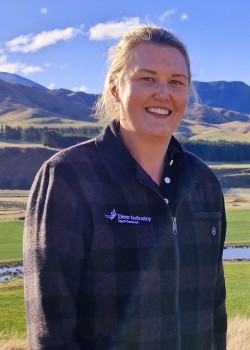Aug 23, 2024
DINZ environmental stewardship manager Luka Jansen has spent time out in the regions over the past couple of months, attending the Wairarapa Deer Farmer’s Association (DFA) annual general meeting (AGM), followed by the Southland DFA AGM, and then the Taranaki DFA AGM. A common hot topic of conversation has been the disconnect between regional councils forging forward with proposals to meet unworkable freshwater regulations.

DINZ environmental stewardship manager Luka Jansen
Back in July, Beef + Lamb New Zealand (B+LNZ) released the findings of a report independently commissioned to highlight “significant issues with the suspended fine sediment and E. coli targets and national bottom lines within the National Policy Statement for Freshwater 2020 (NPS-FM).” DINZ supports the positions as outlined in this summary, which can be read on B+LNZ’s website.
Jansen says, “The independent report is an incredibly valuable piece of work that proves that the NPS-FM creates unrealistic targets for Regional Councils to meet.
“Given the NPS-FM is flawed, Councils proposing to align with this piece of legislation will result in significant consequences. Everyone loses when time, money and resources are wasted. Why start to make a cake if there are key ingredients missing?”
When asked what the solution is, Jansen notes that the answer lies with good public participation at a regional level.
“At present, I don’t think the public is being well informed. Balanced and objective information to assist the public in understanding the problems is lacking. Alternative views are often ignored, with some Councils failing to record and understand the different viewpoints. Local water quality issues and solutions are being announced, often without providing robust science modelling.
“In many circumstances, the engagement process has become a tick-box exercise. I don’t want to point the finger at Councils, as they are under pressure to improve water quality and ecology parameters, however good decision-making practices are vital.”
Jansen would like to see Councils “work with us to find workable solutions,” citing positive interactions with the Ministry for the Environment and Ministry for Primary Industries this year, saying they have been willing to listen and take on board our feedback.
“The ongoing disconnect between regional councils and central government is a real concern for farmers,” says New Zealand Deer Farmers’ Association (NZDFA) executive committee chair Mark McCoard.
“Freshwater targets were already a major concern for many but having that combined with a lack of national cohesion is further exacerbating on-farm stresses. Further uncertainty comes at a time when high on-farm inflation and low relative returns have many questioning their future and ongoing investment in pastoral farming.”
DINZ recognises that freshwater management is very important, and that farmers have a role to play in protecting the country’s waterways and ecology.
“We are extremely proud of our achievements to date,” says Jansen, “with most farmers implementing the Deer Industry Environmental Management Code of Practice.
“DINZ supports the concept of freshwater farm plans as it provides an opportunity for farmers to prove they are undertaking good management practices, which are tailored to mitigate the risk to land and water on their farm. We are working with the central government to simplify the process, as well as reduce bureaucracy and any unnecessary costs so that the focus can be on supporting farmers with good practice.”
Jansen acknowledges that regional rules have a place, yet if those rules are too costly to implement, there is a real risk that this pushes people, jobs and production out of farming or overseas. The reality is the wellbeing of all New Zealanders (and those that consume our exports) depend on food production, and the stability of that production is crucial for New Zealand’s long-term success.
“There needs to be cohesion and a pragmatic approach taken to balancing economic viability and freshwater outcomes,” says McCoard. “Ask those who now live and farm in regions surrounded by both plantation and carbon forestry as to whether their future outcomes are improving. This rapid land use change has been driven in part by the potential costs and concerns these regulations may pose for pastoral farming.”
One positive, according to Jansen, is that central government understands that the current environmental policies are not fit for purpose. DINZ will continue to work with the government in working towards a greener future while also advocating for more pragmatic solutions, balancing food production and the environment.

